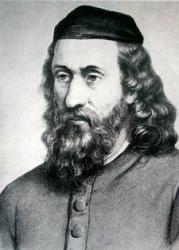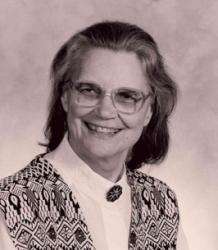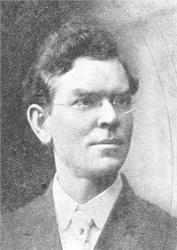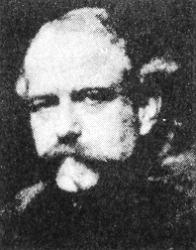Planning worship?
Check out our sister site, ZeteoSearch.org,
for 20+ additional resources related to your search.
- |
User Links
Person Results
David N. Johnson
1922 - 1987 Person Name: David N. Johnson, b. 1922 Topics: liturgical Scripture Songs Composer of "EARTH AND ALL STARS" in Voices United David Johnson (b. San Antonio, TX, 1922; d. Phoenix, AZ, 1987), former music department chairman at St. Olaf College, composed EARTH AND ALL STARS and published it in his Twelve Folksongs and Spirituals (1968). Johnson studied at Trinity, University, San Antonio, Texas, and received his master's and doctoral degrees in music from Syracuse University, New York. In addition to St. Olaf, he taught at Syracuse University; Alfred University, Alfred, New York; and Arizona State University. Johnson was organist at Syracuse University and organist and choir director at Trinity Episcopal Cathedral in Phoenix. His publications include Instruction Book for Beginning Organists and Organ Teacher's Guide; his compositions number over three hundred and include hymn tunes, varied harmonizations, and hymn preludes.
Bert Polman
David N. Johnson
Jan Roh

1487 - 1547 Person Name: Johann Horn Topics: liturgical Scripture Songs Composer of "AVE VIRGO VIRGINUM" in Voices United Pseudonyms--
Johann Cornu
Johann Horn
John Horn
Roh, Johann, was a native of Domascbitz near Leitmeritz, in Bohemia. Roh was his name in Bohemian, but when he wrote in Latin he styled himself Cornu, and in German Horn. In 1518 he was ordained priest and appointed preacher to the Bohemian Brethren's community at Jungbunzlau, in Bohemia. At the Synod of Brandeis, in Sep. 1529, he was chosen as one of the three Seniors of the Unity. Finally, at the Synod of Brandeis, in April 1532, he was appointed Bishop, and held this post till his death, at Jungbunzlau, Feb. 11, 1547. (Koch, ii. 114; Wackernagel, i. p. 727, &c.)
Roh was the editor of the Bohemian Hymn Book of 1541, and is said to have written a number of hymns in the Bohemian language, but the edition of 1561 only gives one with his name. He also edited the second German hymn-book of the Brethren, viz., Ein Gesangbuch der Brüder inn Behemen und Merherrn, Nürnberg, 1544; and seems to have been author or translator of all, or nearly all, of the 32 hymns there added. Another hymn ("O heiliger Vater, glitiger Herr") is also given with his name in the Kirchengeseng, 1566. A considerable number of Ron's hymns passed into the Lutheran hymn-books of the 16th and 17th centuries, and into the Moravian Hymn Books of the 18th cent. Rather curiously in the last Moravian Hymn Books, (the Kleines Gesangbuch, Gnadau, 1870), his name is not found in the list of authors.
Those of Roh's hymns which have been translated into English are:—
i. Gottes Sohn ist kommen. Christmas. In 1544, as above, and thence in Wackernagel iii. p, 350, in 9 stanzas of 6 lines, The heading "Ave Hierarchia" refers to the melody, for it is not a translation from the Latin. Included in V. Babst's Gesang-Buch, Leipzig, 1553, and recently in the Unverfälschter Liedersegen, 1851, No. 6, Strangely enough this fine hymn was omitted from the Kirchengeseng of 1566 and later editions; and though it was included in the Herrnhut Gesang-Buch, 1735, and the Brüder Gesang-Buch, 1778, it has again been omitted from the Kleines Gesang-Buch, 1870. The translations are:—
1. Lo! from highest heaven. A free translation of stanzas i.-iii., vi., by A. T. Russell, as No. 27 in his Psalms & Hymns, 1851. Included, altered, in Kennedy, 1863.
2. Once He came in blessing. A good translation of stanzas i.-iii., v., ix., by Miss Winkworth, in her Chorale Book for England, 1863, No. 26. Included in J. Robinson's Collection, 1869, and the Pennsylvania Lutheran Church Book, 1868.
3. God's Son once descending. This is No. 249 in pt. i. of the Moravian Hymn Book, 1754.
Hymns not in English common use:—
ii. Betrachtn wir heut zu dieser Frist. Easter. 1544 as above, and in Wackernagel, iii. p. 359, in 14 stanzas of 3 lines. Translated as:—(1) "The Saviour Jesus, Friend of Man." As No. 332 in pt. i. of the Moravian Hymn Book, 1754. This is from the recast "Der selge Heiland, Jesus Christ" (based on ii.-v.), as No. 1875 in Appendix xii. c. 1745, to the Herrnhut Gesang-Buch 1735.
iii. Ein starker Held ist uns kommen. Christmas. 1544 as above, and in Wackernagel, iii. p. 352, in 12 stanzas of 4 lines. Translated as (1) "God took our nature upon Him (stanza iii.), as No. 251 in pt. i. of the Moravian Hymn Book, 1754.
iv. Lob Gott getrost mit singen. Christian Church. 1544 as above, and in Wackernagel, iii. p. 360, in 9 stanzas of 8 lines. In the Kirchengeseng, 1566, two st. were inserted between iii. and iv. This form, in 11 stanzas, is No. 563 in the Unverfälschter Liedersegen 1851. In the Brüder Gesang-Buch 1778, No. 1014, is a cento in 3 st. (from st. vi., viii., ix. of the 1544, and iv. of the 1566), beginning "Lass dich durch nichts erschrecken," and this form has been translated as "O be not thou dismayed, Believing little band," as No. 596 in the Moravian Hymn Book, 1886.
v. O Mensch, thu heut hören. Passiontide. 1544 as above, and in Wackernagel, iii., p. 355, in 20 stanzas of 4 lines. The English version is "I am thy Lord and God" (st. ii.), as No. 258, in pt. i. of the Moravian Hymn Book, 1754. [Rev. James Mearns, M.A.]
--John Julian, Dictionary of Hymnology (1907)
Jan Roh
Timothy Dudley-Smith
1926 - 2024 Topics: Scripture Songs Author of "Tell Out, My Soul" in Sing Joyfully Timothy Dudley-Smith (b. 1926) Educated at Pembroke College and Ridley Hall, Cambridge, Dudley-Smith has served the Church of England since his ordination in 1950. He has occupied a number of church positions, including parish priest in the diocese of Southwark (1953-1962), archdeacon of Norwich (1973-1981), and bishop of Thetford, Norfolk, from 1981 until his retirement in 1992. He also edited a Christian magazine, Crusade, which was founded after Billy Graham's 1955 London crusade. Dudley-Smith began writing comic verse while a student at Cambridge; he did not begin to write hymns until the 1960s. Many of his several hundred hymn texts have been collected in Lift Every Heart: Collected Hymns 1961-1983 (1984), Songs of Deliverance: Thirty-six New Hymns (1988), and A Voice of Singing (1993). The writer of Christian Literature and the Church (1963), Someone Who Beckons (1978), and Praying with the English Hymn Writers (1989), Dudley-Smith has also served on various editorial committees, including the committee that published Psalm Praise (1973).
Bert Polman
Timothy Dudley-Smith
Frederic Henry Hedge

1805 - 1890 Topics: Scripture Songs Translator of "A Mighty Fortress" Hedge, Frederick Henry, D.D., son of Professor Hedge of Harvard College, was born at Cambridge, Massachusetts, 1805, and educated in Germany and at Harvard. In 1829 he became pastor of the Unitarian Church, West Cambridge. In 1835 he removed to Bangor, Maine; in 1850 to Providence, and in 1856 to Brookline, Mass. He was appointed in 1857, Professor of Ecclesiastical History at Cambridge (U.S.), and in 1872, Professor of German Literature at Harvard. Dr. Hedge is one of the editors of the Christian Examiner, and the author of The Prose Writers of Germany, and other works. In 1853 he edited, with Dr. F. D. Huntington, the Unitarian Hymns for the Church of Christ, Boston Crosby, Nichols & Co. To that collection and the supplement (1853) he contributed the following translations from the German:—
1. A mighty fortress is our God. (Ein feste Burg.)
2. Christ hath arisen! joy to, &c. (Goethe's Faust.)
3. The sun is still for ever sounding. (Goethe's Faust.)
There is also in the Unitarian Hymn [& Tune] Book for The Church & Home, Boston, 1868, a translation from the Latin.
4. Holy Spirit, Fire divine. (“Veni Sancte Spiritus.")
Dr. Hedge's original hymns, given in the Hymns for the Church, 1853, are:—
5. Beneath Thine hammer, Lord, I lie. Resignation.
6. Sovereign and transforming grace. Ordination. Written for the Ordination of H. D. Barlow at Lynn, Mass., Dec. 9, 1829. It is given in several collections.
7. 'Twas in the East, the mystic East. Christmas.
8. 'Twas the day when God's anointed. Good Friday. Written originally for a Confirmation at Bangor, Maine, held on Good Friday, 1843. The hymn "It is finished, Man of Sorrows! From Thy cross, &c," in a few collections, including Martineau's Hymns, &c, 1873, is composed of st. iv.-vi. of this hymn. [Rev. F. M. Bird, M.A.]
--John Julian, Dictionary of Hymnology (1907)
Frederic Henry Hedge
Jean Tisserand
? - 1494 Topics: liturgical Scripture Songs Author (attributed to) of "O Sons and Daughters, Let Us Sing!" Died: 1494, Paris, France.
A Franciscan monk, Tisserand founded an order for penitent women. He is also said to have written a worship service commemorating Franciscans martyred in Morocco in 1220.
Lyrics: O FILII ET FILIAE, Rex coelestis, Rex gloriae
O Sons and Daughters, Let Us Sing!
Young Men and Maids, Rejoice and Sing
www.hymntime.com/tch
Jean Tisserand
Rae E. Whitney

1927 - 2023 Person Name: Rae E Whitney Topics: liturgical Scripture Songs Author of "Song of Simeon (Lord, God, You Now Have Set Your Servant Free)" in Voices United Rae E. Whitney, 96, of Scottsbluff died Thursday, November 16, 2023, at the Residency in Scottsbluff. Her memorial service will be held 10:00 A.M. Monday, November 27, 2023, at St. Francis Episcopal Church with Reverend Erin Rath officiating. Interment of her ashes will follow at West Lawn Cemetery in Gering. Memorials may be made to the Lied Scottsbluff Public Library or to the church.
Rae was born at Chippenham, Wiltshire, England May 21, 1927, the only daughter of Alice Martha “Pat” Davis and Arthur James Phillips. Educated at Chippenham Grammar School and the University of Bristol, she received her B.A. (Englis Honors) degree in 1948 and Certificate of Education in 1949. She was lady President of Bristol University Branch of the Student Christian Movement 1947-48.
Rae taught in secondary schools in Bicester, Oxfordshire in Wotton-under-edge, Gloucestershire and in London. During this time, she also served as a lay preacher in various village chapels. She had a life-long concern for the greater understanding between churches, and from 1958-60 she lived at St. Basil’s House in London as a resident Secretary of the Fellowship of St. Alban and St. Sergius, working both with Eastern Orthodox Churches and those of the west.
In June of 1960, on a coach tour of Italy, heading for the Passion Play in Oberammergau, Austria Rae met the Rev Clyde E. Whitney, Rector of St. Andrew’s Episcopal Church, Scottsbluff, NE. They were married in Chippenham on December 31, 1960. Scottsbluff then became her home.
The Whitneys started the local observance of the Week of Prayer for Christian Unity in 1962 and during the mid-sixties worked to establish The Retreat House of the Transfiguration at Bayard. After Father Whitney’s retirement in 1969, they served the English-speaking congregation in Guatemala City, Central America for 12 months. From 1979-85 they were volunteer local coordinators for the American Bible Society.
During his 23 years of retirement, when Clyde was called to serve various churches in Nebraska and Wyoming, Rae was licensed to help her husband as a lay reader and eucharistic minister. She was on the Board of Friends of the Scottsbluff Library for a long time and served on the Editorial Board of Bosom Buddies Network, Regional West Medical Center. She led several weekly Bible classes for many years. She was elected President of Church Women United, Scotts Bluff County 1967-68 and CWU State Vice President 1981-82. She became Diocesan State President of the Episcopal Church Women 1976-77 and served on the national Episcopal Church’s Women’s Triennial Committees 1973-79. She was appointed Worship Chairman for the 1979 Triennial Denver.
Soon after her arrival here, Rae became interested in local history and in the 1980’s wrote “A Portrait of Dr. Georgia Arbuckle Fix”, which has been presented over fifty times in the region. Rae was also a free-lance writer of reviews, articles, and poems, but was most widely known for her hymn writing. Of her several hundred hymn texts, some have found their way into several denominational hymnals and supplements in the United States, Canada, Scotland, England, Hong Kong, and Australia. Four collections of her hymns have been published by Selah Publishing Co.
Rae was a member of St. Francis Episcopal Church (formerly St. Andrew’s), YMCA, Friends of the Library, American Association of University Women, the Cooperative Ministries Council, Church Women United, Fraternity of Prayer for Christian Unity, Fellowship of St. Alban and St. Sergius and the Hymn Societies of the US, Canada, Great Britain, and Ireland.
After the Whitneys moved to Northfield Villa, Gering in 1988, Rae soon became editor of the Villa’s newsletter. Clyde died April 22, 1992, and in 1993 Rae moved to the Residency in Scottsbluff and continued to edit the monthly newsletter for both retirement communities.
Rae was preceded in death by her husband; parents; her young brother Kenneth and her special friend, Edward Doemland of Milwaukee, WI.
She is survived by cousins in England and many valued friends, especially Eva Carne, of Ellensburg, WA and Jane Wisniewski, of Scottsbluff, NE. --Obituary
Rae E. Whitney
Ernst W. Olson

1870 - 1958 Topics: liturgical Scripture Songs Translator of "Children of the Heavenly Father" Ernst W. Olson (b. Skane, Sweden, 1870; d. Chicago, IL, 1958) prepared the English translation for the 1925 Hymnal of the Lutheran Augustana Synod. As editor, writer, poet, and translator, Olson made a valuable contribution to Swedish-American culture and to church music. His family immigrated to Nebraska when he was five years old, but he spent much of his life in the Chicago area. Educated at Augustana College, Rock Island, Illinois, he was editor of several Swedish-American newspapers and spent most of his professional career as an editor for the Augustana Book Concern (1911-1949). Olson wrote History of the Swedes in Illinois (1908). He also contributed four original hymns and twenty-eight translations to The Hymnal (1925) of the Evangelical Lutheran Augustana Synod and served on the committee that produced the Lutheran Service Book and Hymnal (1958).
Bert Polman
Ernst W. Olson
W. H. Neidlinger

1863 - 1924 Person Name: William Harold Neidlinger Topics: liturgical Scripture Songs Author of "The Birthday of a King" William Harold Neidlinger USA 1863-1924. Born at New York, NY, he studied with organists Dudley Buck and C C Muller (1880-90) in New York. He played the organ at St Michael’s Church in New York City. He also conducted the Amphion Male Chorus and the Cecilia Women’s Chorus in Brooklyn, and the Treble Clef Club and Mannheim Glee Club in Philadelphia, PA. He taught in the music department of the Brooklyn Institute of Arts & Sciences. He went on to study with E Dannreuther in London (1896-98) then worked in Paris as a singing teacher until 1901. In 1897 he married Alice Adelaide Maxwell Sypher, and they had a son, Harold. Returning to American in 1901, he settled in Chicago, IL, where for several years he was one of the prominent singing teachers. He wrote music for a religious mass, He published a comic opera, Ulysses” in 1898, another opera, “Sweet Anne Page” (1903), a cantata, “Prayer, praise, and promise”. two song books, “Songs of the campfire girls of America”, and “Small songs for small singers” (1896), a standard work for kindergartens, that was so successful that he.became interested in child psychology and nearly abandoned music. He even established a school for handicapped children in East Orange, NJ, where he taught his theories of musical pedagogy and speech and vocal therapy. He wrote several secular songs and edited a number of vocal songbooks, especially for children. He was a theorist on musical methods and education. He died at Orange, NJ. He was an author, composer, and lyricist.
John Perry
W. H. Neidlinger
Erik Routley
1917 - 1982 Person Name: Erik Routley (1917-1806) Topics: Scriptural Songs Harmonizer of "SPETISBURY" in The Summit Choirbook
Erik Routley
Richard Hillert

1923 - 2010 Topics: liturgical Scripture Songs Composer of "FESTIVAL CANTICLE" in Voices United Richard Hillert was born in Granton, Clark County, Wis., on March 14, 1923. There he attended parochial and public schools and later enrolled at Concordia Teachers College (now Concordia University Chicago), River Forest, where he received the Bachelor of Science degree in Education. He served as teacher and music director for parishes in St. Louis, Mo., Wausau, Wis., and Chicago and Westchester, Ill. He received both the Master of Music and the Doctor of Music degrees in composition from Northwestern University, Evanston, Ill. His teachers included Matthew Nathaniel Lundquist, Anthony Donato, Alan Stout, Arrand Parsons, Emil Nolte, and John Ohl. He studied composition with the Italian composer, Goffredo Petrassi, at Aaron Copland’s Berkshire Music Center, Tanglewood, Mass.
Richard Hillert was a noted Lutheran composer. He was Distinguished Professor of Music Emeritus at Concordia University Chicago, River Forest, Ill. He was best known for his work as a composer and teacher of composition. Among his most frequently performed liturgical works for congregation is Worthy Is Christ, with its antiphon, “This is the Feast of Victory” which was written as an alternate Song of Praise for inclusion in Setting One of the Holy Communion in Lutheran Book of Worship (1978) and Lutheran Worship (1982). "This is the Feast" is now widely published in more than 20 recent worship books of many denominations, most recently in Lutheran Service Book (2006) and Evangelical Lutheran Worship (2006). Other major liturgical works include a setting of Evening Prayer (1984) and a Eucharistic Festival Liturgy (1983), which was first performed at Holy Name Cathedral in Chicago. He wrote liturgical pieces and hymns and served as music editor for Worship Supplement(1969) and Lutheran Book of Worship (1978). His compositions and publications include an array of pieces of liturgical music for congregation, choral motets, hymns and hymn anthems, psalm settings and organ works, concertatos, and cantatas, including settings of The Christmas Story According to Saint Luke and The Passion According to Saint John. He edited eleven volumes of the Concordia Hymn Prelude Series.
Hillert's career as Professor of Music at Concordia (now Concordia University Chicago) spanned four decades, from 1959 to 1993. During this time he taught classes in music theory and composition, music literature, 20th century music, orchestration, keyboard instruction, comparative arts and liturgical worship. He served in various capacities in the music department, as chair in 1964-65 and from 1986–89, as coordinator of the Master of Church Music program, and as associate editor of the journal Church Music (1966–80).
Non-liturgical compositions include symphonic works for orchestra (Symphony in Three Movements, Variations for Orchestra, Suite for Strings), chamber works for small orchestra and ensembles (Alternations for Seven Instruments, Divertimento I and II) as well as many works for keyboard, instrumental solos and songs. The latter include Sonata for Piano (1961), a violin sonata, and two sonatas for flute and keyboard. Major organ works include Prelude and Toccata, Ricercata, Passacaglia on Innocent Sounds, Partita on Picardy, and Partita on Atkinson. There are also concert works with sacred texts, such as Five Canticles from the Exodus (1958), Te Deum for two pianos, percussion, and wind instruments (1962), The Alleluiatic Sequence (1980), and Seven Psalms of Grace for baritone solo and chamber orchestra (1998). Extended choral works, many written for Concordia’s Kapelle conducted by Thomas Gieschen, include the Cantata: "May God Bestow on Us His Grace" (1964), "Motet for the Day of Pentecost" for choir, vibraphone, and prepared electronic tape (written for the round-the-world tour in 1969), "Motet for the Time of Easter" for double choir, percussion, and harp (1971), and "Agnus Dei" for three choirs and percussion instruments (1974).
Richard Hillert authored numerous scholarly articles and reviews for the periodicals such as Church Music, CrossAccent, and Currents in Theology and Mission, and other professional books and journals. He received an honorary Doctor of Sacred Music degree from Valparaiso University, and honorary Doctor of Letters degrees from Concordia University at Seward, Nebraska, and Concordia Seminary, St. Louis. He was an honorary life member of the Association of Lutheran Church Musicians. His former students throughout the land have careers as practicing church musicians, elementary and secondary school teachers, teachers in higher education, music editors and publishers, and composers.
Richard Hillert was married to Gloria Bonnin Hillert. They had three children: Kathryn Brewer, Virginia and Jonathan Hillert.
--en.wikipedia.org
Richard Hillert


 My Starred Hymns
My Starred Hymns

